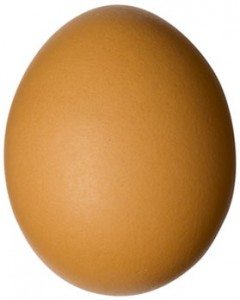It’s the strangest thing, but it turns out that authors like to play with language. And more often than not this playfulness translates directly into translator migraines. Today I’m working on a fun little food-themed essay-story by Yoko Tawada entitled “Okonomiyaki,” and she leads off with an exchange about protein – which in German is most commonly referred to as Eiweiß or “egg white.” There’s a historical explanation for this:  albumin from egg whites (which themselves are also called albumen – both from “albus,” the Latin word for “white”) was among the first proteins discovered back in the 18th century. In the Tawada piece, she describes an exchange in which her narrator informs a German interlocutor that, gram for gram, tofu contains more protein than chicken. That’s impossible, he responds: Soybeans don’t lay eggs. Where’s the Eiweiß supposed to come from?
albumin from egg whites (which themselves are also called albumen – both from “albus,” the Latin word for “white”) was among the first proteins discovered back in the 18th century. In the Tawada piece, she describes an exchange in which her narrator informs a German interlocutor that, gram for gram, tofu contains more protein than chicken. That’s impossible, he responds: Soybeans don’t lay eggs. Where’s the Eiweiß supposed to come from?
So the question for me is: Where’s the humor supposed to come from? Explaining a joke is a surefire way to kill it, but without explanation this joke would be stillborn anyhow. The easiest way around the problem would be to add an explanatory footnote, but no one likes footnotes in translations, particularly when the thing being footnoted is the punch-line of a joke. My strategy in cases like this is generally to smuggle into the translation just as much additional information as is needed to allow the reader to follow; ideally, the interpolation will be seamless, elegant and unobtrusive. In this particular case, I am considering two different lines of approach, one that is more historical, and one that is more linguistic. The latter is more obviously justified here, since other forms of linguistic playfulness show up elsewhere in the essay. For example, there’s a bit where Tawada describes a “Kammmuschel” (queen scallop) in such a way that it soon becomes clear she’s describing the word itself: it “has two pillars and three ms in its shell.” In my version, that bit now reads: “The scallop has two pillars in the middle of its shell.” It doesn’t really matter that my scallop loses the “queen” in its name – it’s not a queen in German anyhow, it’s a comb – since the only reason Tawada chose that particular form of scallop was the unpronounceable three ms in the middle of its name. It’s only fairly recently that one finds triple consonants in German words: only since the national spelling reform of 1996 (which served primarily to make the written language uglier, if you ask me). Before this, whenever the creation of compound nouns produced triplets, one would always be pleasantly elided, so that e.g. the word “bedsheet” (Bett + Tuch) would be written Bettuch and not – as it is now – Betttuch, which to me  looks like something that belongs in a cemetery. Because these triple consonants are relatively new in German, you really notice them when they turn up, which is why I think Tawada was inspired to riff on the structure of this word. But I digress. Here are my two just-now-brainstormed options for handling the Eiweiß passage:
looks like something that belongs in a cemetery. Because these triple consonants are relatively new in German, you really notice them when they turn up, which is why I think Tawada was inspired to riff on the structure of this word. But I digress. Here are my two just-now-brainstormed options for handling the Eiweiß passage:
A.
Human life is a coming and going of proteins. Once I remarked to an acquaintance in Frankfurt that 100 grams of tofu contain more protein than 100 grams of chicken.
He shook his head in denial and said: That’s impossible. Soybeans don’t lay eggs. The most important proteins are albumins. Albumins come from albumen, the white of the egg. Where is this albumin supposed to come from?
B.
Human life is a coming and going of proteins. Once I remarked to an acquaintance in Frankfurt that 100 grams of tofu contain more protein than 100 grams of chicken.
Since Germans use the word Eiweiß (egg white) to mean “protein,” he shook his head in denial and said: That’s impossible. Soybeans don’t lay eggs. Where is the egg white supposed to come from?
I’m leaning toward the second option. What do you think?


No, the first. It makes him seem a bit pompous, and thus the joke better.
I like the second, because it signals it as a language joke, rather than a joke about protien.
Polish has the same problem–“białko” or “white” for “protein.” I learned this from a Mexican friend in Poland who was discussing diet with a physical trainer, who emphasized that “białko” was the most important element of a good diet for building muscle. At first he thought the trainer was some sort of fanatic about eating egg whites.
Ask Rabassa. He’s good at these kinds of problems.
David Goldfarb
I like B. Don’t know the context, so can’t say for sure, but if the narrator is not German, as you seem to suggest, then the second rendering has the benefit of reminding readers again of her foreignness.
love the blog, btw!
I think the first works better – it brings out his pedantry, which is the source of the joke in the original. The second reads like you are trying to explain the punchline without actually giving it.
Having said all that, the bit that stuck out for me was “coming and going” in “Human life is a coming and going of proteins.” The register doesn’t seem right – I think it more likely that someone would say “Human life is a constant flux of proteins” or such like. That’s my two cents worth, anyway. 😉
No, I take that back. The register could be ok, but “coming and going” klingt nicht (or is it just that NZ English is different?). Perhaps “to’ing and fro’ing”, but that misses the in-out ‘flow’ sense which I suspect is underlying the “coming and going” … perhaps to satisfy my own sense of language, and resistance to sticking to the original question, I’d suggest “Human life is [just] a flow of proteins in and out.” But that sux too. Damn, that’s why literacy translation belongs in a Fine Arts degree, oder?
I like B because it’s simpler and retains the humor. I think A would be hard to follow for someone who hadn’t read your previous explanation. And I agree with Stuber about underlining the foreignness of the narrator. Nice work on the scallops, btw.
Thanks for the feedback, folks. Yoko Tawada has herself now weighed in, and she votes for option B, which was also my preference. It’s not that authors are always right about translation choices, or that you necessarily need their permission to do things, but sometimes I like to check in with an author when I’m playing rough and loose with her text. I’m still fiddling with the first line as well – one current option on the table is “Human life is a give and take of proteins.” But she really did write “coming and going,” so I might wind up returning to that.
I like “give and take”.